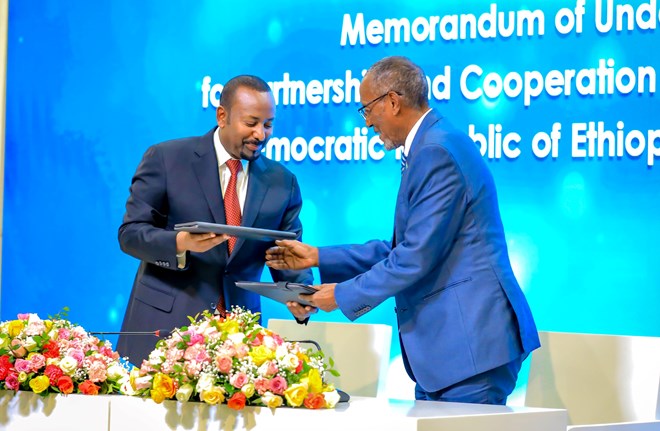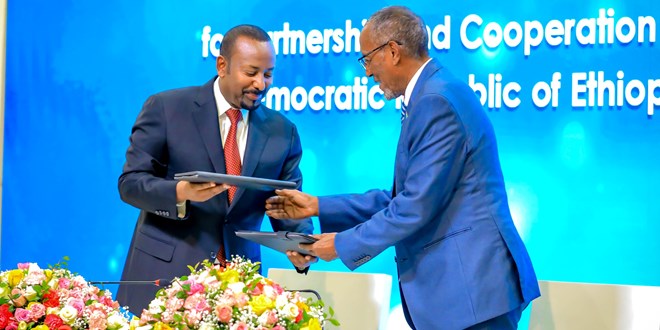[ad_1]
Thursday January 4, 2024

In a surprising turn of events on the first day of 2024, Ethiopian Prime Minister Abiy Ahmed and Muse Bihi Abdi, the leader of the self-declared Republic of Somaliland, inked a Memorandum of Understanding (MoU). This landmark agreement grants Ethiopia more than 12 miles of sea access for its naval forces for the next 50 years, while Ethiopia, in return, pledges to formally recognise Somaliland as an independent nation. However, the implications of this accord stretch far beyond the Horn of Africa, opening a Pandora’s box of international diplomatic challenges.
Ethiopia’s Maritime Quest: A Landlocked Dilemma
Ethiopia’s argument lies at the heart of its status as a landlocked nation, aspiring to break free from geographic constraints and secure a foothold on the sea. The quest for maritime access is not new; however, the method chosen to achieve it has raised eyebrows. While nations traditionally negotiate sea access through diplomatic channels, Ethiopia’s approach takes a unique twist, intertwining its maritime aspirations with acknowledging Somaliland’s sovereignty.
The significance of this move lies in Ethiopia’s recognition of the challenges posed by its landlocked status, a condition shared by many African countries. Yet, the question remains: is a bilateral agreement disregarding international norms the solution?
The Pan-African Predicament: A Sea of Separatist Movements
Ethiopia’s decision to recognise Somaliland as an independent nation raises concerns about the potential ripple effect on other African countries grappling with separatist movements. From Ambazonia in Cameroon to Western Togoland in Ghana, Biafra in Nigeria, Casamance in Senegal, and Sahrawi in Morocco, the continent is no stranger to autonomy-seeking regions.
David Forniès, in his article ‘Secessionist demands in Africa: an overview,’ highlights Ethiopia’s internal struggles. Since 2020, Ethiopia has been embroiled in an armed conflict with the Tigray region, where demands for autonomy echo throughout various federated states like Oromia and the Somali State. Recognising Somaliland’s independence might set a precedent that other African nations with separatist movements could exploit, potentially leading to a cascade of secessionist recognitions and conflicts.
The ramifications of such a scenario are profound. Africa, a continent already grappling with geopolitical complexities, could face further fragmentation. International borders, often drawn without considering ethnic or tribal affiliations, could be redrawn, leading to increased instability and conflict.
Landlocked Nations and Maritime Agendas: A Regional Conundrum
Another critical issue stemming from the Ethiopian-Somaliland agreement is the potential impact on the sixteen landlocked countries in Africa. Each of these nations faces the challenge of balancing their maritime aspirations with respect for their neighbours’ sovereignty and territorial integrity.
Hosting the African Union headquarters, Ethiopia is expected to set an example of respecting African borders. However, the recent agreement suggests otherwise, raising concerns about how other landlocked nations might interpret and respond to Ethiopia’s approach.
Ignoring the sovereignty and integrity of neighbouring countries in pursuing maritime access sets a dangerous precedent. Such actions could spark tensions, jeopardise regional stability, and undermine the principles of international diplomacy that Africa, as a continent, seeks to uphold.
Conclusion: Navigating Troubled Waters with Diplomacy
While the Somaliland issue is a reality demanding attention, Ethiopia’s unilateral approach to solving its maritime challenges underscores the complexity of navigating international diplomacy in Africa. The continent must address separatist movements with a balanced and principled approach, respecting historical trajectories, regional agreements, and international laws.
Mohamed Mukhtar Ibrahim
Former Minister of Petroleum and Mineral Resources of the Federal Government of Somalia
[email protected]
[ad_2]
